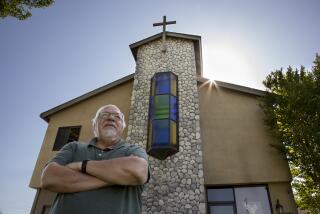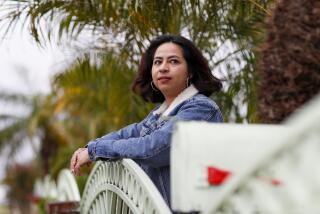Loose-Knit Churches of Christ Share a ‘Tradition’
- Share via
The 13,000 congregations called Churches of Christ never hold a national convention or make pronouncements on social issues. They have no headquarters or denominational officials. They join neither ecumenical councils nor evangelical coalitions.
While their basic beliefs resemble those of other conservative Protestants, they are distinctive for their a cappella hymns--barring organs and pianos from church services because the New Testament doesn’t say the early church used musical instruments.
They cherish individual church autonomy so much that even calling them a fellowship implies an undesired organizational structure.
Yet, “this tradition,” as some of the 1.7 million members have come to call it, does enjoy a cohesiveness through a dozen independently run periodicals and annual lecture conferences at colleges founded by Churches of Christ stalwarts.
Thus, the 53rd annual Bible Lecture Conference at Pepperdine University beginning Tuesday night on the Malibu campus will serve as a four-day, in-house forum on issues for about 4,000 church members from 41 states, and as a window into a Bible Belt tradition barely known to outsiders because of the movement’s insular nature.
Eighty percent of Churches of Christ adherents live within a 400-mile-wide band running from Chattanooga, Tenn., to El Paso, said Tom Olbricht, retiring chair of Pepperdine University’s religion division.
“We really are more in the border states than in the Deep South,” said Olbricht.
Nevertheless, their nearly 700 churches in California make them the state’s sixth-largest denomination in terms of congregations, although the average church has only 100 members, said Jerry Rushford of Agoura Hills, who directs the Pepperdine conference and the university’s church relations.
“This being California,” Pepperdine’s annual lectures program “is perceived a little left of center” by folks in Tennessee, Arkansas and Texas, Rushford said. The largest and most influential of the annual conferences--with about 15,000 registrants--is held at Abilene Christian University in Texas.
But even in California, some pastors characterize Pepperdine as liberal. “I find some of the lectures thought-provoking, but I’ve seen a progression toward liberalism over the years,” said Pastor Dennis Kilgo of the Canoga Park Church of Christ.
Pepperdine, which moved from central Los Angeles to its Malibu hillside in 1972, has the appearance of a modern liberal arts university. All together, the main campus and its satellites in Encino and other suburban locations enroll about 7,800.
Founded in 1937 by Kansas-born George Pepperdine, who started Western Auto Supply Co., the university today describes itself as nonsectarian, merely maintaining “a relationship” with the Churches of Christ. However, the university’s top officials and the majority of its Board of Regents belong to the Churches of Christ, and Pepperdine “actively recruits faculty, staff and students from their churches,” said Jeff Bliss, director of public information.
The university’s 2,300 undergraduate students must abide by a strict code of conduct and take at least three religion courses. But the formerly required weekly chapel session is now called the weekly convocation, and it sometimes deals with nonreligious topics. Social dancing--a slowly fading taboo in conservative Christian schools--has been permitted on campus for six years.
On a number of points, Pepperdine University and its annual Bible lectures conference are called “liberal or left-wing by right-wing people in the Churches of Christ,” Olbricht said.
Despite liberal-conservative differences, the Churches of Christ have not experienced the kind of raucous battles over the Bible’s authority that have occurred between Southern Baptist moderates and fundamentalists in recent decades, Olbricht said.
“If I said to a church group that I believe in the inspiration of the Bible and said nothing more, no one would argue with me,” said Olbricht, author of “Hearing God’s Voice,” published this week. He indicated he would not face antagonistic questions about whether he believes that the Bible is error-free, historically reliable or should be interpreted literally.
He said that standard historical-literary analysis of the Bible is taught at Pepperdine and that Yale biblical scholar Abraham Malherbe, a Churches of Christ member, will speak at next week’s campus conference.
The Churches of Christ grew out of efforts by 19th century frontier preachers to restore the primitive church of the New Testament. Two of the faith’s key practices are full-immersion baptisms of come-of-age believers in their teens and serving Communion at Sunday worship.
Sharing the same roots are two other denominations, the relatively liberal Christian Church (Disciples of Christ), based in Indianapolis, and the conservative North American Christian Convention, based in Cincinnati. In 1906, a split divided the present-day Churches of Christ from congregations that used musical instruments in church or supported foreign missionary agencies.
In a much-praised new book on the Churches of Christ, Pepperdine historian Richard T. Hughes said that in scholarly terms the movement began as a sect and has moved increasingly toward becoming a denomination--but since the 1960s has been unable to decide which it wants to be.
As a result, Hughes contended in “Reviving the Ancient Faith,” while most conservative churches have grown in membership, the Churches of Christ have been stagnant, perhaps even declining in numbers. His book, published by Eerdmans, will be discussed in three workshops at next week’s conference.
One of the best-known members of the Churches of Christ in the late 1960s was singer and actor Pat Boone, whose clean-cut image was an expression of his church upbringing. But Boone caused a flap in 1969, when he announced that he had been speaking in tongues, the ecstatic utterances that are emblematic of Pentecostal and charismatic churches. Boone was expelled, as are all Churches of Christ members who embrace Pentecostal beliefs.
In 1979, one of several revival movements within the Churches of Christ turned into an aggressively proselytizing, authoritarian group dubbed the Boston Church of Christ. Led by Kip McKean, who moved to Los Angeles about a decade later, the group is now called the International Churches of Christ. It especially seeks recruits at colleges, but its requests years ago to meet on the Pepperdine campus were rebuffed by the school’s administrators.
The Churches of Christ have gained respect from conservative Christians who have made San Antonio Pastor Max Lucado a popular author. Three of his books were among the top 10 bestsellers in Christian bookstores last month, according to the Evangelical Christian Publishers Assn. Lucado’s “The Final Week of Jesus” was No. 1 on the list.
“Lucado was our final-night speaker last year for the Bible lectures,” said conference director Rushford. “I’ve think I’ve had him speak at seven of the 14 conferences I’ve run.”
Another ambassador for the Churches of Christ is Pepperdine President David Davenport, who has maintained a friendship with presumptive Republican presidential candidate Sen. Robert Dole and will speak on “Clinton, Dole and Christ” Wednesday morning at the conference.
What do other Christians think about the Churches of Christ? Southern Baptist-raised, best-selling author John Grisham (“The Firm,” “The Client”) told a Churches of Christ-oriented magazine that his father was raised in a Church of Christ and he counts members among his friends.
“We view you as kindred spirits who should break down and enjoy the benefits of pianos and organs,” Grisham said, adding, tongue in cheek: “It’s just too bad we can’t spend eternity together.”
More to Read
Sign up for Essential California
The most important California stories and recommendations in your inbox every morning.
You may occasionally receive promotional content from the Los Angeles Times.













